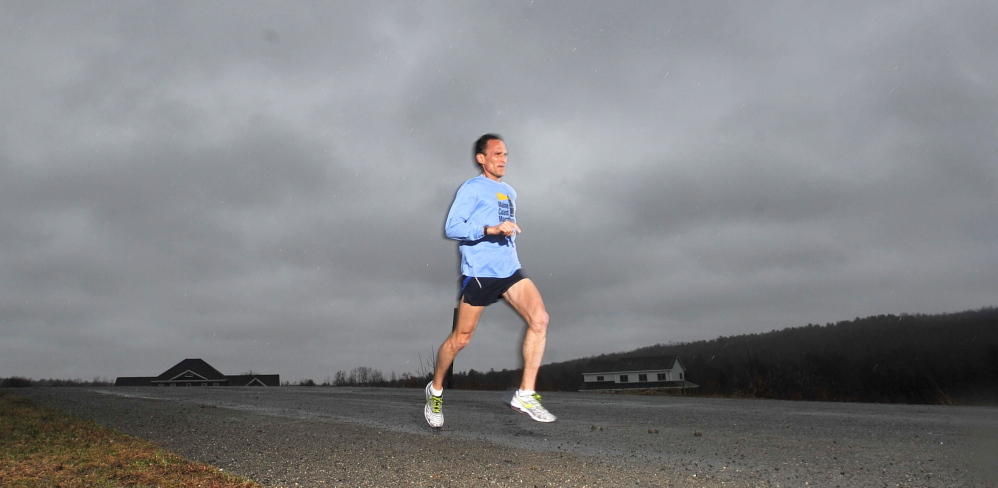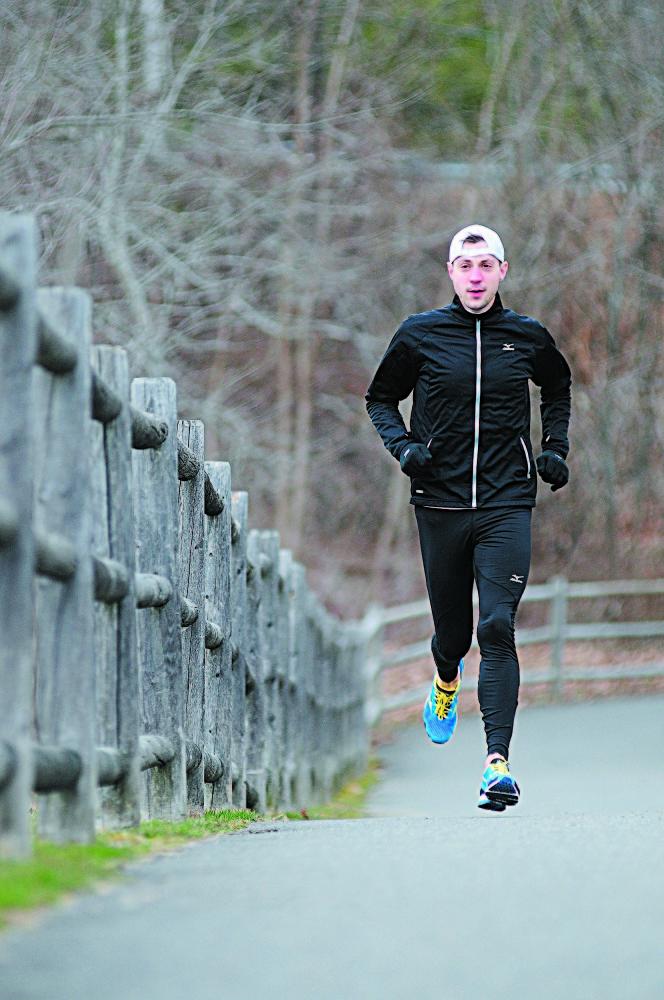If last year’s Boston Marathon had been an ordinary one, Seth Hasty probably wouldn’t be running this year.
The 34-year-old West Gardiner man runs a lot of races and is around even more of them in his marketing job for Skechers Performance Division. Before starting his second Boston Marathon last year, he thought 2014 might be a good year to take a break.
Hasty had finished with a personal best and was at a Copley Square restaurant with his wife and toddler son when the bombs exploded a quarter-mile away. In the fear and confusion of that day, he thought there was no way he’d run this year.
“The next morning I woke up, and it was all I wanted to do,” Hasty said. “I wanted registration to be that morning. I couldn’t wait to sign up.”
Hasty is one of tens of thousands of runners who enter Monday’s marathon under the looming specter of last year’s bombing attack, which killed three and injured more than 200 at the finish line.
Many have taken this year’s event as an opportunity to demonstrate that they will not live in fear, even as they admit concerns that the world is becoming less safe. Hasty said that motivated him on those days in the past year when he didn’t want to get out of bed early to run.
“That’s all I can personally do. I’m not in the military. I can’t go overseas. I can’t fight terrorism,” Hasty said. “But if I can get up and lace up my shoes, get out there and show them that we can’t be defeated that easily, that’s something I have to do.”
Waterville orthodontist Brian Morin also feels different as he trains for this year’s run than when he ran the marathon two years ago. Then, it was for the sheer pleasure of a sport that he’s enjoyed for most of his life.
But this year, “I want to join with everyone else to show all the bad people in the world that we’re going to continue doing what we love to do,” he said. “I’m not going to back down.”
Last year, Morin was a spectator at the event. He said the biggest reason he and his family weren’t injured in the attack was timing — they left the site of the second of two bombs about a half-hour before it exploded.
“I take it personally,” Morin said. “I kept questioning myself as to whether I had seen the guys and if I could have done anything.”
Morin and other runners are eager to prove that the enduring legacy of the attack will be not terror, but resilience.
After last year’s stress, Hasty’s wife and son, now 3 years old, will stay home to watch the marathon on TV with friends on Monday. Hasty said he’s hoping for another personal record, but he also wants to take in more of the crowds and scenery this year.
“For the first time, the clock isn’t the number one thing on my mind,” Hasty said. “I want to absorb it and take in the experience — look at the Citgo sign (in Boston’s Kenmore Square) instead of my watch.”
Bruce Maxwell, a Colby College professor from Pittsfield, completed last year’s marathon a half-hour before the first of two bombs exploded, Jill Maxwell, his wife, said Tuesday.
The worst time for her came after the attack, when she was trying to get her husband on the phone.
“I heard what happened and tried to get a hold of him immediately, but he was in the shower,” she said. “The takeaway for us is really that these kinds of things can happen to anyone, anytime. There really isn’t any time when you are safe anymore, and you’re going to make a decision on how you’re going to let it affect you.
“Our decision was that we weren’t going to live in fear of that kind of thing. Then the folks trying to get you in terror have won.”
Bruce Maxwell is in South Korea on a business trip until Saturday. His wife said his biggest concern about the marathon this year is that he’ll still be on Korea time on Monday.
Joe Gagnepain, who grew up in Farmington before moving to the Boston area 15 years ago, said he won’t ever forget the bombings or the subsequent manhunt, which ended when thousands of law enforcement officers caught Dzokhar Tsarnaev hiding under a boat just a few hundred yards from his front door. The arrest ended a period of hair-raising uncertainty for Gagnepain and his roommates, who were so worried by the sound of gunshots and the lack of information about how many terrorists were in the area that they stood guard at three entrances to the home, holding swords in their hands to defend themselves.
He noted that the neighboring community of Newton often has been cited as one of the safest places in America by various groups, based in part on low crime rates.
“You can definitely say it makes you realize that these types of things can happen in any neighborhood in America,” he said. “The idea that we’re going to move to small-town suburbia and be insulated from anything is kind of over.”
Gagnepain said he runs past the sites associated with the bombing every day, but they have long since lost their power over his imagination.
“I go out and run on the road right next to where the shootout happened, and I don’t feel unsafe,” he said. “People aren’t going to stay away.”
In the Boston area, Gagnepain said, the days leading up to the marathon have stoked the fires of patriotism and Boston pride.
“There’s definitely a feeling of coming together now that the marathon’s here,” he said. “It does create this feeling that we won’t go quietly into the night. We’re going to go out there in numbers and say, âThis isn’t going to work.'”
The manhunt for the bombing suspects started near the Cambridge apartment where Katie Rollins was living a year ago. Rollins, who grew up in Augusta and graduated from Cony High School, now lives in South Boston and said the city feels permanently changed.
“Boston’s always had a good sense of loyalty and closeless, and I think that’s become stronger than ever,” she said. “I don’t think there’s a day that goes by when I’m in the city where I don’t see some reference to âBoston Strong.'”
Feeling that they had to do something, Rollins and a friend poured the energy and emotion of that week into designing T-shirts bearing the legend “617,” Boston’s area code, that they sold to benefit the One Fund for the bombing victims. They raised about $5,000 in a week, Rollins said.
Though she wasn’t affected directly as much as others were, Rollins said she feels strong emotions at the anniversary.
“It’s given me such a sick feeling in my stomach to relive that that I really just try to avoid reading and watching these shows about it,” she said. “I lived through that week. I don’t need to be reminded. I just want to take the time to think and reflect on it on my own.”
Morine will return to the site of the bombings, this time to run alongside thousands of others. He said he probably would have entered the marathon this year anyway, but the attacks left him more determined to make sure it happened.
His wife and two children will be there to cheer him on, although he hopes they will sit some distance away from the finish line, which he believes will be safer.
Morin said there’s something about the character of people who are willing to push their bodies through more than 26 miles of pain that makes them especially resistant to the distant fear of a possible danger.
“If you’re a marathoner,” he said, “you’re already crazy.”
Send questions/comments to the editors.




Comments are no longer available on this story